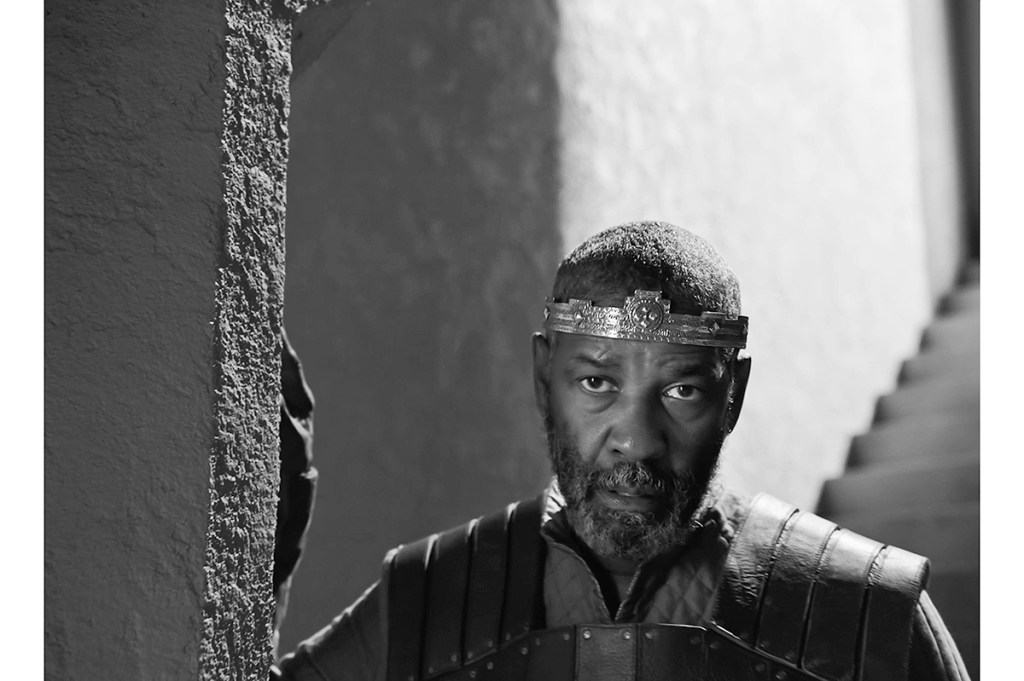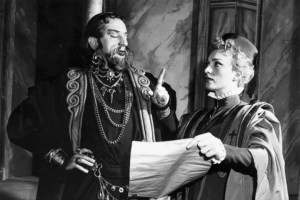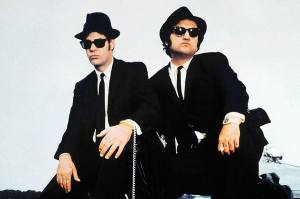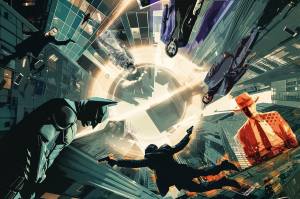Since its initial publication in the legendary 1623 First Folio, Shakespeare’s Macbeth — one of the Bard’s late tragedies, and among his greatest — has been reimagined in countless ways. By the late seventeenth century, it had already been updated by Sir William Davenant to meet changing tastes. It was supposedly restored (though still thoroughly altered) by David Garrick in the eighteenth; and it was further “cleaned up” by Thomas Bowdler (which gave us the term ‘bowdlerized’) for his Family Shakespeare collection in the nineteenth century, an era that also brought us Verdi’s enthralling operatic version. More recently, it has been adapted for the big screen by the likes of Orson Welles and Roman Polanski, as well as for television and comic books — culminating, perhaps inevitably, with Something Wicked: The Macbeth Video Game.
Now Joel Coen brings his own memorable vision of Shakespeare’s masterpiece to the screen in The Tragedy of Macbeth (A24/IAC Films), starring Denzel Washington in the title role. Coen has long been known, with his brother Ethan, as one half of the Coen brothers, a writing and directing team responsible for such popular and critically acclaimed films as Fargo and No Country for Old Men, as well as diverting cult classics like Raising Arizona and The Big Lebowski. For his first solo directorial effort, Joel sheds the parodic antics, as befits this most serious of serious Shakespeare plays.
At first, Denzel Washington’s Macbeth is curiously calm — coiled like a snake and slow to anger. When pressured into a violent rage, desperate to gain and keep power, he is downright terrifying. Washington (who has played Othello, Richard III and Coriolanus and appeared as Don Pedro in Kenneth Branagh’s film adaptation of Much Ado About Nothing) delivers the infamous usurper’s soliloquies with entrancing force, turning painfully inward before flailing out at his impending fate. His delivery fully captures the power of Shakespeare’s blank verse: “And all our yesterdays have lighted fools/ The way to dusty death. Out, out, brief candle!”
All along, our flawed hero is suitably magisterial. It is hard to look away. Beside him, Frances McDormand (who is married to Coen) delivers an eerily seductive and disquieting Lady Macbeth. Perhaps the most startling performance comes from Kathryn Hunter as the trio of witches (a three-for-one deal), whose unnerving anatomical contortions give credence to their gnomic utterances. Corey Hawkins (Macduff), Bertie Carvel (Banquo), Alex Hassell (Ross), Harry Melling (Malcolm) and Brendan Gleeson (Duncan) round out a talented multiracial cast.
Filmed on sound stages and employing austere backdrops of heath and battlement, The Tragedy of Macbeth often feels more like a theatrical production than a motion picture. It omits the Hollywood effects and cast-of-thousands moments that tend to distract from the essential action. The production designer Stefan Dechant’s sparse halls and bleak hills plumb expressionistic depths, and the film bears comparison to the chiaroscuro cinematography of Bergman’s Seventh Seal and Sir Laurence Olivier’s 1948 Hamlet.
Macbeth is well suited to screen adaptation, being one of Shakespeare’s shorter plays. Still, while lines and scenes must be pruned in any film version, Coen mostly lets things be. His occasional interpolations, such as the use of the fool Feste’s song from Twelfth Night, are inspired. The cinematographer Bruno Delbonnel’s black-and-white palette divides the screen into profound shadows and harsh pools of light — “let not light see my black and deep desires” commands Macbeth to the very stars — as each fateful decision drives the thane and his wife forward. There are elements more commonly associated with slasher movies, including jump-scares and fortissimo bursts of sound, such as when a haunting unkindness of ravens erupts onto the screen.
This all befits Shakespeare’s original. Macbeth is a tragedy distinguished by betrayal, murder and regicide, but it’s also a horror story laden with omens, madness and apparitions. After all, it is the trio of Weird Sisters (they “come like shadows, so depart”) whose beguiling prophecies set the tragedy in motion. To this day, actors consider it unlucky to so much as utter the play’s name while in a theater, preferring simply “the Scottish Play.”
Coen wisely sets his film in its historical milieu, with ramparts, broadswords and bucklers. This allows a sense of serious purpose, honoring the original setting and fortifying the film against premature aging. It also spares us the sight of castle guards flicking at iPhones. While The Tragedy of Macbeth retains much of the excitement and visual dazzle one expects from the Coen brothers, it is also a departure, stripped down to a gripping degree of lethal urgency. One hopes this extraordinary film is an auspicious first of its kind: a Joel Coen movie. It has earned a place among the best adaptations of Shakespeare’s tragedy.
This article was originally published in The Spectator’s March 2022 World edition.


















